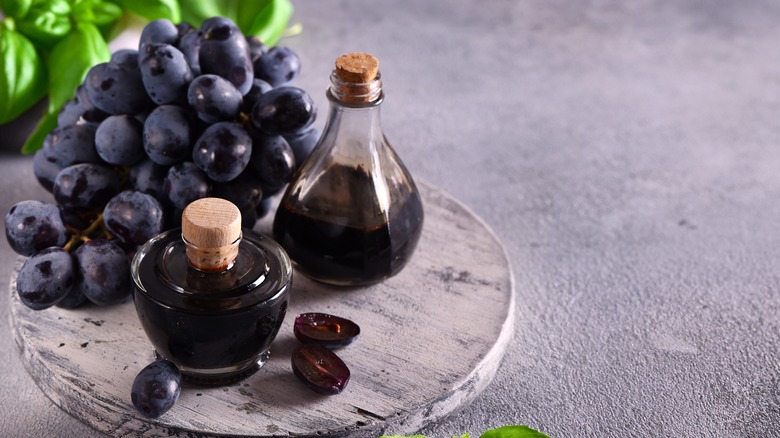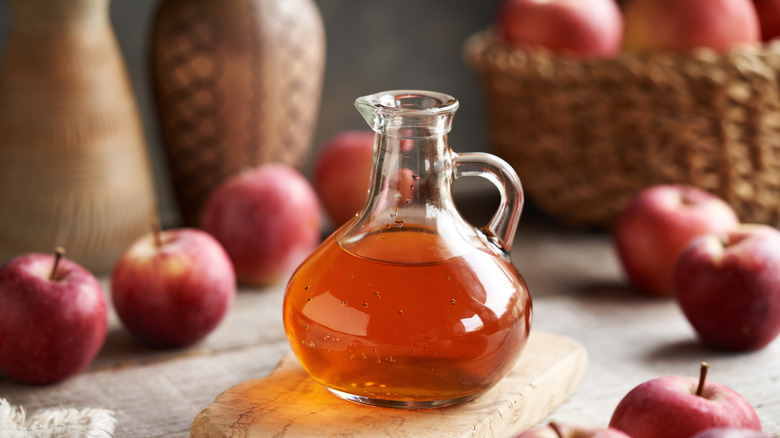3 Simple Substitutes For Red Wine Vinegar In A Recipe
In a perfect world, your kitchen would always be stocked to the brim. Every spice jar would be magically full, and the olive oil bottle would never run dry. Unfortunately, when it comes to staple ingredients like red wine vinegar, it seems like they run out right when you need them most. Not to worry, however, because there are plenty of red wine vinegar substitutes probably in your pantry right now.
Chef Angelo Sosa, of the restaurants Tía Carmen and Carmocha in Indian Wells, California, and Kembara in Arizona, told Food Republic that his preferred red wine vinegar sub is sherry vinegar. He noted, "You'll get a deeper sweet-like [note] of the red vinegar. The sherry will be more complex though [it's] a great substitute."
Sherry vinegar can be substituted 1:1 for red wine vinegar in any recipe, and it is a little sweeter and milder, so you may need to increase the amount you use and dial back other sweet ingredients like honey, maple syrup, or agave syrup. A basic sherry wine vinaigrette can do anything a red wine vinaigrette can do, but if you find the nutty, toasty characteristics of sherry vinegar to be too much, there are also other options.
Mix white wine vinegar with red wine
Red wine vinegar is not a complex concoction; it's simply red wine that has been exposed to a bacteria called Acetobacter, which changes the alcohol into acetic acid. You've probably accidentally made vinegar at home if you have ever left a half-empty bottle of red wine sitting out on the counter for too long. With that in mind, all you need to make more red wine vinegar is some white wine vinegar and regular red wine. The acetobacter in the white wine vinegar will create the same acidic tang you're looking for, and the red wine will provide the tannic, earthy flavor.
Mix plain red wine and white wine vinegar in a ratio of 1:3. If you only need a few tablespoons of vinegar, for example, use 3 tablespoons of white wine vinegar for every tablespoon of red wine. Ideally, if you know you're going to need a red wine vinegar substitute ahead of time, it's better to mix the two ingredients and let them meld for a few hours — or two weeks if you really want to let it ferment properly. However, in a pinch, it's perfectly fine to mix the two on the fly for most recipes.
Apple cider vinegar is a fruity and tart swap
As long as the red wine vinegar isn't the star of the show, like in a red wine vinaigrette, you can also get away with using the same amount of apple cider vinegar if you're running low on the red wine variety. This is a great swap if you're making anything with tomatoes, like a basic tomato sauce, or if you need some flavored vinegar for making pickled red onions, olives, or giardiniera.
Apple cider vinegar is made through the same process as red wine vinegar (except using apple cider), although it has strongeracidity. Cider vinegar also has a signature fruity flavor, which will likely pair well in any recipe calling for red wine vinegar, but keep in mind that it won't taste exactly the same as its red brethren. You can swap it out 1 for 1 with red wine vinegar, and if you really want that wine-y flavor and color, try mixing a small amount of red wine into the cider vinegar, just like the white wine vinegar/red wine substitute mentioned earlier.
If you don't have any of these substitutes, try exploring other culinary vinegars in a pinch. Most of them have similar acidity, but always be sure to taste them before you add anything to a recipe. Remember that it's always easier to add more of a flavor than it is to take it away!



